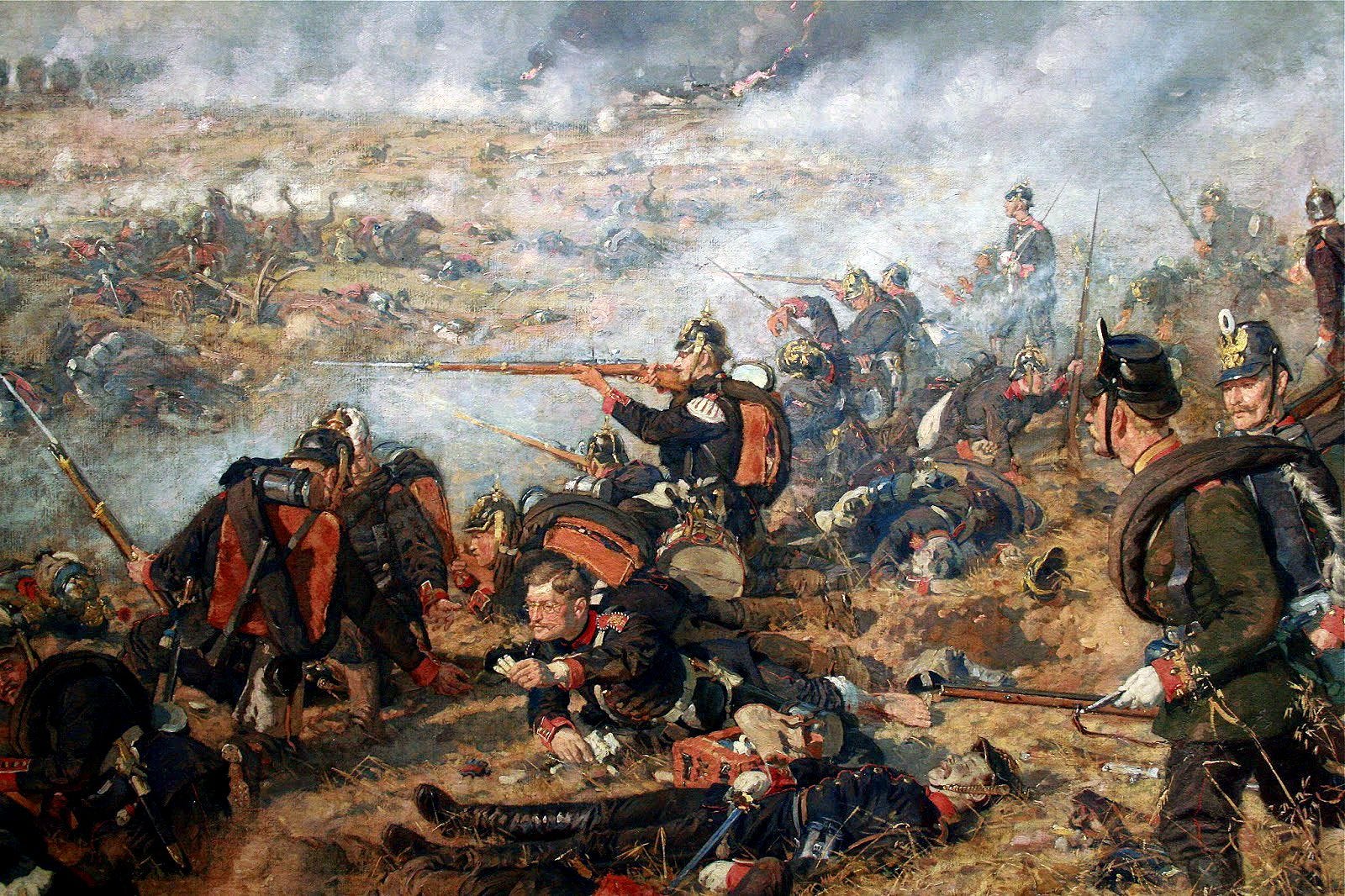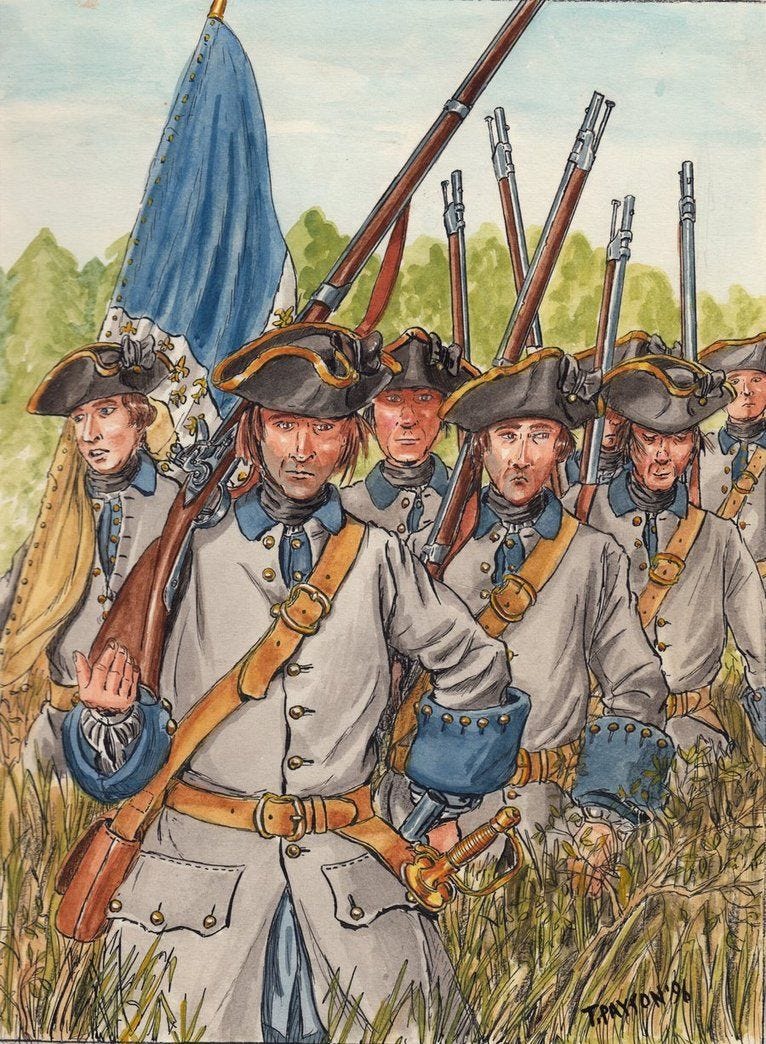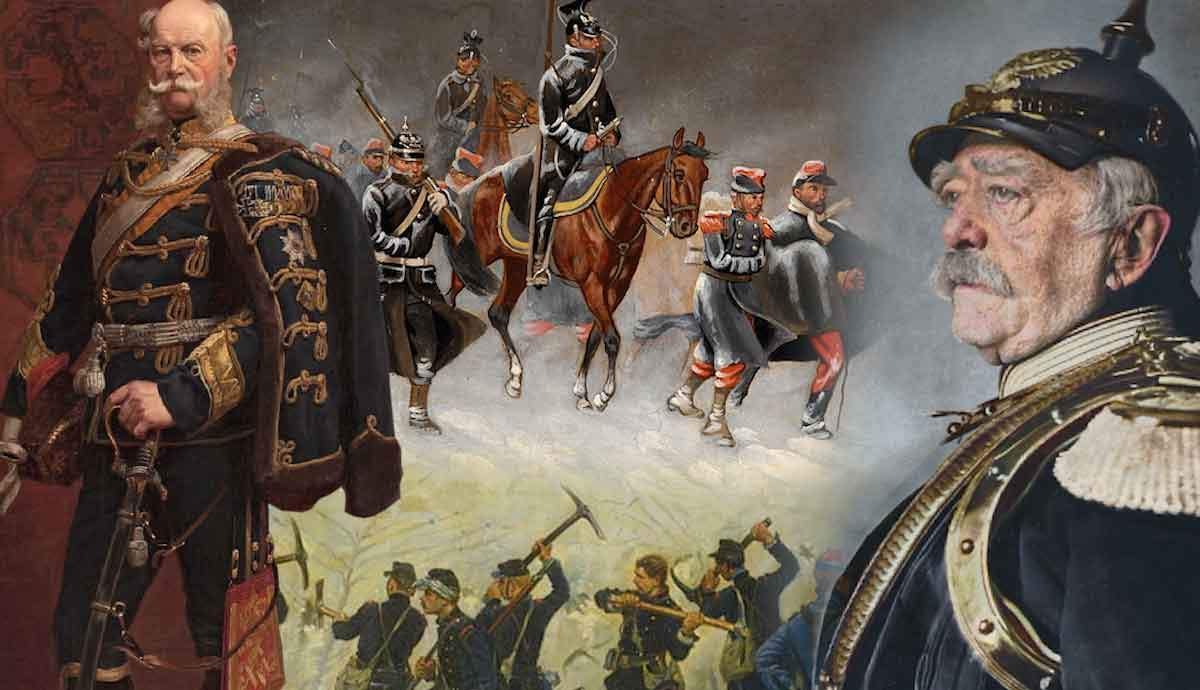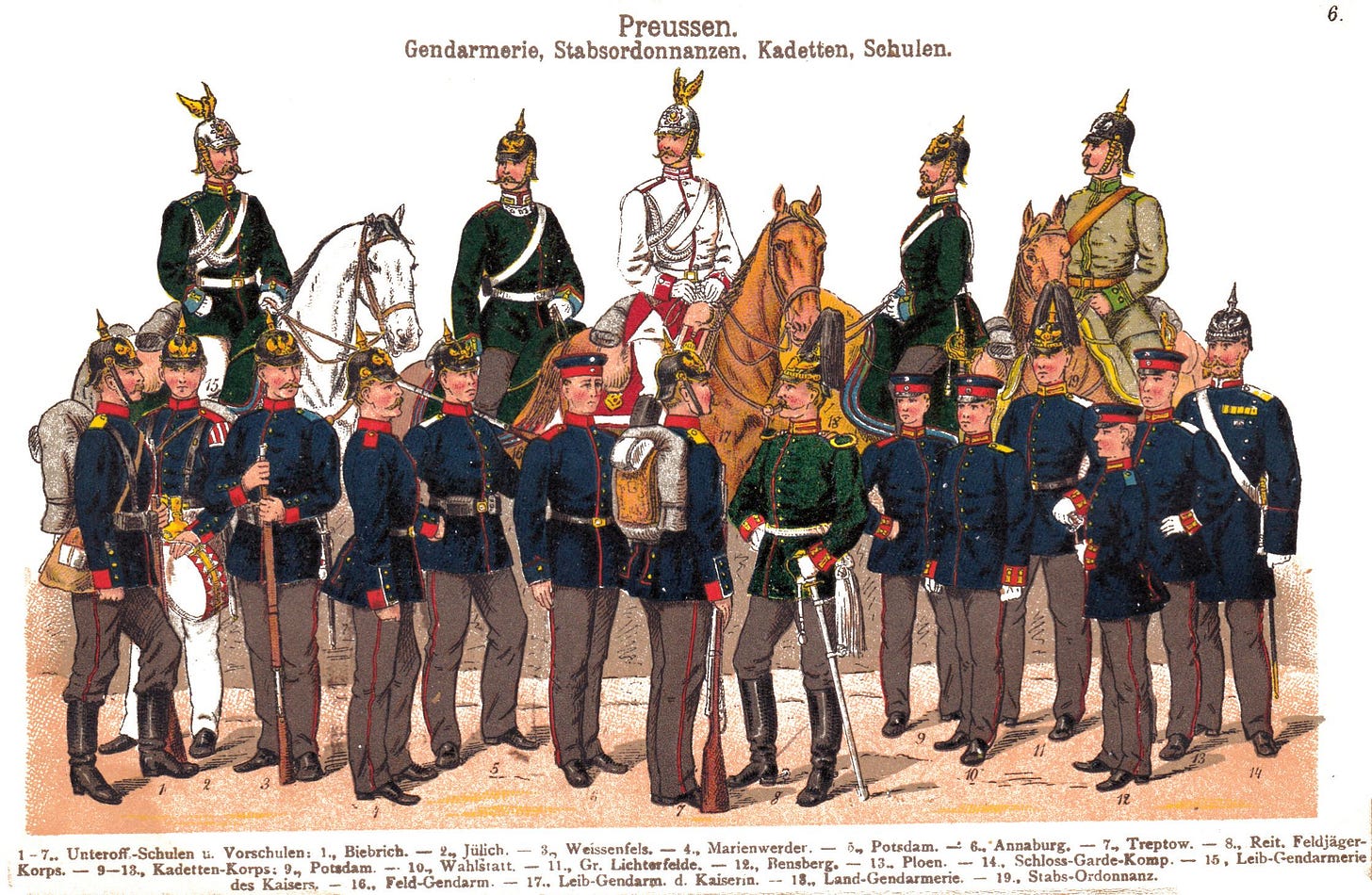How the Industrial Revolution upset the military balance of power
And it changed the incentives of European political elites
Most of my book series and this Substack column is about how geography, economics, and technological innovation came together to create human material progress. This created a long-term increase in the material standard of living for the masses.
A society that experiences rapid economic growth, however, does not just transform its citizen’s standard of living. It can also shift the regional or global balance of power. A certain portion of the revenues generated from economic growth can be used to build a powerful military machine.
Particularly if the society experiencing progress has a large population, this potentially upsets the current military balance of power. This in turn potentially changes the winner in future military conflicts. And winners tend to impose their culture, values, and institutions on the losing side.
Progress can be spread by military victories by nations that experience progress. Progress can also be crushed if that same nation suffers a military defeat, particularly to an authoritarian regime.
Balance of Power before the Industrial Revolution
Before the Industrial Revolution societies that experienced progress were typically Commercial societies based on one or more city/states. Though those cities were large for their time, their total population was dwarfed by rival Agrarian empires, such as:
Spanish Empire
Kingdom of France
Habsburg Empire (based in what is now Austria)
Kingdom of Prussia
Russian Empire
Though Commercial societies were very proficient at warfare, in the long run they could not compete against this vast population disparity. One by one most Commercial societies were conquered by predatory Agrarian empires and their material progress was suffocated.
The Ancient Greek commercial city/states were conquered by the Macedonian Empire and later the Roman Empire.
Starting with the French invasion in 1494, the Medieval city/states of Northern Italy gradually fell under the domination of the French, Spanish, and Austrian empires.
Spanish rule in Flanders (part of modern-day Belgium) undermined the Commercial societies of Flanders. The Sack of Antwerp in 1576 was particularly destructive.
The French invasion of the Netherlands in 1672 signaled the end of Dutch economic growth. Though the Dutch managed to maintain their independence, they were gradually squeezed out by the mercantilistic economic and military policies of the French and British empires.
The Industrial Revolution shifted the Balance of Power
With the Industrial Revolution, the military balance of power between free societies, monarchies, and empires began to shift. First Britain industrialized, followed by the United States, Australia, New Zealand, and Canada. This combined with massive immigration from Britain and other European nations fundamentally shifted the global balance of power. By 1900, the combined economic and military might of the United States and the British Empire was larger than any single European empire.
Secondly, the Industrial Revolution forced Agrarian elites to copy many of the technologies, skills, and social organizations of the British. As we will see, Agrarian elites tried to copy military technologies in ways that maintained their traditional dominance. In the end, they only succeeded in bringing down their own societies, typically after experiencing a crushing defeat in war.
Rather than Agrarian empires conquering tiny Commercial city/states, now it was Industrial Democracies with massive military machines subjugating European empires.
Security Imperatives
All elites in traditional societies and modern authoritarian regimes have two imperatives to stay in power:
The Domestic Security imperative: Do not allow rival elites to rise up to challenge your rule. This makes economic growth potentially dangerous as such growth potentially leads to new centers of wealth and power.
The Natural Security imperative: Do not allow the militaries of foreign rivals to conquer you. Ideally, you should conquer them first.
Note: by traditional societies I mean all Society types, except Commercial and Industrial societies. This covers virtually all societies before the Industrial Revolution.
So elites in traditional societies and modern authoritarian regimes fear losing power to other elites. From their perspective domestic revolution and defeat in war are just two different sides of the same coin.
Political elites in authoritarian regimes have to balance these two competing imperatives. If polities are not embedded within a regional system of military competition, the Domestic Security imperative dominates. This tends to create stability. The elites can sleep well at night.
If, however, polities are embedded within a regional system of military competition, the National Security imperative sometimes overcomes the Domestic Security imperative. In those circumstances, elites need to worry about both internal and external threats to their rule. In certain situations, this can lead to top-down domestic reform and economic growth. In other situations, this leads to revolution from below.
This article is part of my multi-part series on How progress spread across the globe:
How Progress Spread Across the Globe (podcast)
How the Industrial Revolution upset the military balance of power (this article)
How Progress shaped the Great Power conflicts of the 20th Century
The following is an excerpt from my book From Poverty to Progress: Understanding Humanity’s Greatest Achievement. You can purchase discounted copies of my book at my website, or pay full prize at Amazon.
If you are interested in this topic, you should read my “From Poverty to Progress” book series:
Changing Elite Incentives
If we survey human history, we can see how material progress and economic growth changed elite incentives.
Phase 1: Political elites oppose innovation: Between the invention of agriculture and the Industrial Revolution, elites largely opposed innovations that were necessary to create economic growth. They did so because they feared innovations would create economic wealth for those who might challenge political elites in the future. Elites in agricultural regimes preferred to live in a poor nation with them in total control compared to a richer nation that they did not control.
Life was zero-sum and life was good for elites (but few others).
Phase 2: Political elites promote the copying of innovations to promote economic growth, but only when it enhances their military power: Then political elites gradually realized that technological innovation and economic growth would help them to build powerful military machines. A powerful military would enable political elites to win in the zero-sum military struggle against other political elites. Leaders in less developed nations realized that they had to copy the innovations made in wealthier nations, to avoid falling behind their militaries.
From about 1200 to well into the early 20th Century, European political leaders gradually lost their aversion to innovation because they knew that they had no choice. They were still afraid of the future political consequences (and rightly so), but they knew that they had to keep up with other nations. In general, political leaders in Northwest Europe learned this lesson faster than political leaders in Eastern Europe. Not surprisingly, those leaders won most wars.
This incentive was pushed into overdrive by the Industrial Revolution in Britain. British economic power easily translated into military power. If rival European empires did not copy those technologies, skills, and organizations, they would fall far behind in the military balance of power. So now external threats were so great that traditional European elites had to overcome their fear that economic growth would lead to new elites who would challenge their rule.
The National Security imperative overcame the Domestic Security imperative.
This view carried over into the totalitarian regimes of the 20th Century, including Fascist Italy, Nazi Germany, Imperial Japan, the Soviet Union, and Communist China. They all promoted economic growth, but only as long as it translated into military power.
This article is part of my multi-part series on How progress spread across the globe:
How Progress Spread Across the Globe (podcast)
How the Industrial Revolution upset the military balance of power (this article)
How Progress shaped the Great Power conflicts of the 20th Century
Much of the above is an excerpt from my book From Poverty to Progress: Understanding Humanity’s Greatest Achievement. You can purchase discounted copies of my book at my website, or pay full prize at Amazon.
If you are interested in this topic, you should read my “From Poverty to Progress” book series:











1) In a sense the national security threat keeps elites honest. Without an objective way of measuring societal strength (victory in war) it all becomes court intrigue.
This is one reason I don't buy into the idea that Russia has become weakened by the recent war. The attritional losses are small relative to the society, but its gone from being a state that can't measure strength accurately to one that can (from tanks to drones, from the peace generals to the war generals, etc).
In a way weak states need more war than strong states because they lack mechanisms to measure performance in peacetime. This explains part of why Russia always starts weak and gets stronger, war provides the objective testing mechanism its civil society can't.
One could make the same comment about America on a lessor scale, who now knows that even with two years time, they can't make a 155mm shell. And it should be learning that its planes and ships are as vulnerable as its tanks.
2) I'm a huge supporter of nuclear weapons and MAD, because I see the alternative as endless industrial war that is was more damaging then the old cabinet war, but I can't help but not notice that the lack of external existential threat allows modern societies to get really loopy.
When Xi visited SF they cleaned up all the junkies for a week. We obviously have the capacity to fix things, but without that external threat we don't.